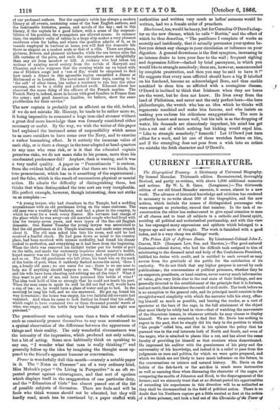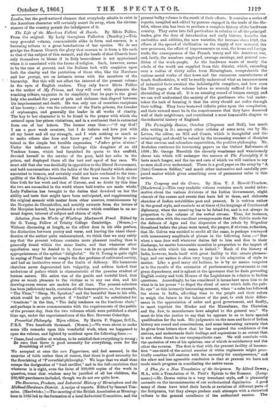The Prison Life of Jefferson Davis. By Lieutenant - Colonel John J..
Craven, M.D. (Sampson Low, Son, and Marston.)—The good-natured lieutenant-colonel doctor, who had the difficult task assigned to him of ministering to the diseased mind and body of the Confederate President, fulfilled his duties with credit, and is entitled to such reward as may- accrue from the gratitude of the public for the satisfaction of its. curiosity. We do not think that any higher purpose is served by such publication; the conversations of political prisoners, whether they be ex-emperors, presidents, or head-centres, never convey much information of value, give very little clue to the real state of their feelings,.and are generally directed to the establishment of the principle that it is fortune, and not merit, that determines the result of civil strife. The book before us- is no exception to the general rule, and its principal merit consists in the straightforward simplicity with which the narrator tells his story, effac- ing himself as much RS possible, and leaving the reader, as a sort of spectator at the bats bf the cage, in the full attainment of the object that most likely he solely had in view—that of watching the movements of the illustrious inmate, in whatever attitude he may choose to display himself. We are not surprised to find that Mr. Davis has nothing to regret in the past, that he simply did his duty in the position to which " his people " called him, and that in his opinion the policy that he pursued was in thereat interests both of North and South, and even of the negro, who is attached to places like a cat, and has about the same faculty of providing for himself as that creature when domesticated- He impressed his auditor with the genuineness of his piety and the • universality of his knowledge, and indeed it is a relief to pass from the judgments on men and politics, for which we were quite prepared, and which we think are not likely to have much influence on the future, to the conversations on science and natural history. Mr. Davis on the habits of the fish-hawk or the ant-lion ifl much more instructive as well as amusing than when discussing the character of the negro, or- comparing the merits of Johnston and Hood, to the disparagement of the former; and we sincerely trust that at no distant period his opportunities of extending his experiences in this direction will be as unlimited as. they shall be circumscribed in the field of political action. There is no doubt that his Northern captors got a little excited at first at the notion of a State prisoner,, and took a leaf out of the Chronicles of the Towilr oft
London, but the good-natured element that everybody admits to exist in the American character will certainly assert its sway, when the circum- stances of the country permit the indulgence of it.































 Previous page
Previous page